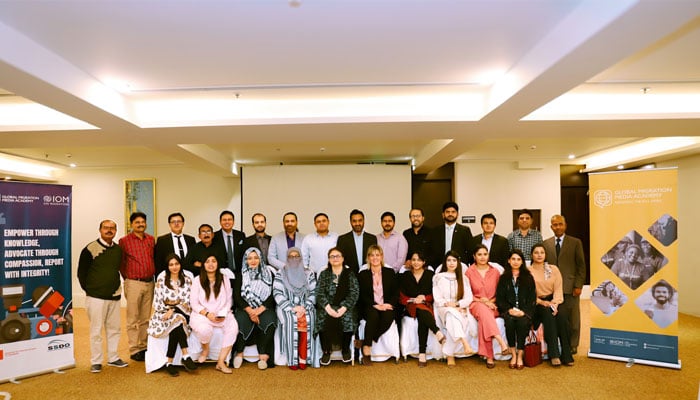Training workshop for media persons on human trafficking
Islamabad: Over 100 journalists and media professionals from across Pakistan participated in the training workshops that covered a range of topics such as key concepts and legal frameworks of Trafficking in Person and human smuggling, media's role in prevention and protection efforts, victim-centred and gender sensitive approaches to reporting, identifying stories through community engagement, and ethical use of data.
The International Organization for Migration (IOM) Pakistan, in partnership with the Global Migration Media Academy (GMMA), and the Sustainable Social Development Organization (SSDO), successfully concluded a series of trainings dedicated to improving ethical reporting practices on Trafficking in Persons (TIP) and Smuggling of Migrants (SOM) in Pakistan.
From 13 to 22 November 2023, IOM organized three trainings within the framework of the project ‘Countering TIP and SOM in Pakistan’, funded by the Ministry of Foreign Affairs Denmark and aiming to support the Government of Pakistan on achieving various objectives under the National Action Plan (NAP) to combat TIP and SOM (2021-25). The trainings also emphasized on recognizing the emotional toll associated with reporting on sensitive subjects, the training also addressed the importance of self-care and support mechanisms for journalists and media professionals. Highlighting the vital role of journalists in combatting TIP and SOM while protecting the victims, Suzana Paklar, Senior Programme Coordinator, IOM Pakistan, in her opening remarks highlighted that, "In the pursuit of truth, journalists are the torchbearers of justice, and their narratives have the power to spark positive change in societies. Through capacity building on responsible reporting, IOM aims to empower journalists to be the voices of those who often go unheard."
Over the course of each training, Sandra Ruiz Moriana, the lead trainer from IOM’s GMMA, equipped journalists with practical tools on ethical reporting on TIP and SOM, enhancing their abilities to responsibly and precisely report on these sensitive issues, and empowering them to fight misperceptions relating to these crimes.
Representing SSDO, Syed Kausar Abbas covered aspects relating to legal frameworks on TIP and SOM. He clarified the roles of law enforcement entities, such as police departments and the Federal Investigation Agency (FIA), in combatting TIP and SOM and provided a comprehensive overview of the NAP and the role of media in its implementation.
The trainings also featured participation of renowned senior journalists such as Myra Imran, Vice President, National Press Club, who shared her experiences and insights while working on the subject and shed light over ground realities and challenges. Commenting on the impact of the trainings, one of the participants shared that “routinely reporting on sensitive subjects such as TIP and SOM has potential to desensitize us to the sufferings of the victims. This training has helped us refocus and serves as a reminder to approach victims with empathy”.
-
 Prince Harry And Meghan Unlikely To Meet Royals In Jordan
Prince Harry And Meghan Unlikely To Meet Royals In Jordan -
 Hero Fiennes Tiffin Shares Life-changing Advice He Received From Henry Cavill
Hero Fiennes Tiffin Shares Life-changing Advice He Received From Henry Cavill -
 Savannah Guthrie's Fans Receive Disappointing News
Savannah Guthrie's Fans Receive Disappointing News -
 Prince William Steps Out For First Solo Outing After Andrew's Arrest
Prince William Steps Out For First Solo Outing After Andrew's Arrest -
 Jake Paul Chooses Silence As Van Damme Once Again Challenges Him To Fight
Jake Paul Chooses Silence As Van Damme Once Again Challenges Him To Fight -
 Google Disrupts Chinese-linked Hacking Groups Behind Global Cyber Attacks
Google Disrupts Chinese-linked Hacking Groups Behind Global Cyber Attacks -
 Four People Killed In Stabbing Rampage At Washington Home
Four People Killed In Stabbing Rampage At Washington Home -
 Meghan Pushes Prince Harry Into Territory That’s Dangerous To His Brand: ‘She Isn’t Hearing A Word Of It’
Meghan Pushes Prince Harry Into Territory That’s Dangerous To His Brand: ‘She Isn’t Hearing A Word Of It’ -
 Christina Applegate Reflects On Lasting Impact Of Being Molested In Childhood
Christina Applegate Reflects On Lasting Impact Of Being Molested In Childhood -
 Martin Short Makes Big Decision Following Tragic Death Of Daughter
Martin Short Makes Big Decision Following Tragic Death Of Daughter -
 Antarctica’s Mysterious ‘gravity Hole’: What’s Behind The Evolution Of Earth’s Deep Interior?
Antarctica’s Mysterious ‘gravity Hole’: What’s Behind The Evolution Of Earth’s Deep Interior? -
 Hilary Duff Addresses Ashley Tisdale's 'toxic Mom Group' Claims And Matthew Koma's Firey Response
Hilary Duff Addresses Ashley Tisdale's 'toxic Mom Group' Claims And Matthew Koma's Firey Response -
 Jack Hughes's Proximity To Trump Angers Tate McRae Fans
Jack Hughes's Proximity To Trump Angers Tate McRae Fans -
 Neve Campbell Opens Up About Her 'difficult Decision' To Not Sign 'Scream 6'
Neve Campbell Opens Up About Her 'difficult Decision' To Not Sign 'Scream 6' -
 Nobel-winning Scientist Resigns From Columbia University After Epstein Links Revealed
Nobel-winning Scientist Resigns From Columbia University After Epstein Links Revealed -
 Prince William Remarks At BAFTAs 'indicative' Of King Charles Physical, Mental Health Too
Prince William Remarks At BAFTAs 'indicative' Of King Charles Physical, Mental Health Too




